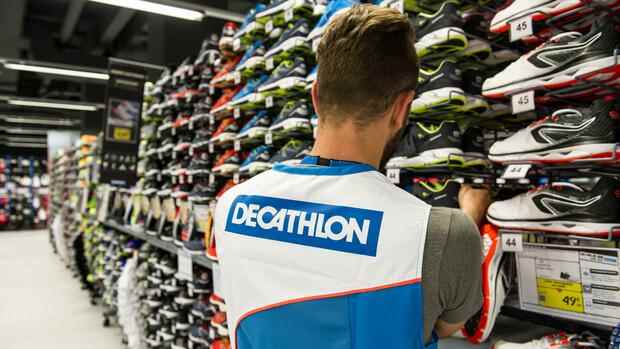The number of stores in Germany is expected to increase from a good 80 to 110.
(Photo: dpa)
Munich The sporting goods retailer Decathlon has sent a declaration of war to the competition in Germany. Gross sales are to be more than doubled to 2.5 billion euros by 2026. “We want to be the first address for sports products in Germany,” said Germany boss André Weinert on Tuesday.
Decathlon is a rapidly growing company in the German sports retail market, viewed with suspicion by established competitors such as Intersport and Sport2000. The French mainly rely on 75 inexpensive own brands. There is also a new marketplace with currently 200 external brands.
In the industry, Decathlon is considered a discounter. Weinert said you don’t see yourself that way. The range is large, as is the focus on service.
The number of branches in Germany is to increase from a good 80 to 110 stores. This year, Decathlon expects net sales in Germany to increase by almost seven percent to 712 million euros.
Top jobs of the day
Find the best jobs now and
be notified by email.
After the lockdowns, customers were able to be won back in the summer months, and online business is booming, Weinert said. For comparison: in 2015 the revenues were 259 million euros. The share of online business is currently around 40 percent and should increase to 60 percent in the medium term.
Decathlon also has delivery problems in some areas
With the goal for 2026, Decathlon is based on gross sales. Here the group expects around 953 million euros for 2021.
The situation in the industry is currently ambivalent for both manufacturers and retailers. The demand is high – many customers started cycling or running again during the Corona period. But lockdowns in South Vietnam, where many sporting goods manufacturers are producing, and problems in the supply chains have tightened supply.
Puma boss Björn Gulden said that he had given his wife the tip to buy the Christmas gifts as early as possible this year. In many shops you have to expect empty shelves.
So it’s a supply, not a demand problem that the industry is currently facing. It is a good thing if you can deliver or receive deliveries. In this diffuse situation, some have to lower their forecasts, like recently the world’s largest sporting goods company Nike.
Others, such as Puma, cannot deliver as much as they could sell. Nevertheless, business is going so well that the outlook is being raised every three months.
With a net turnover of more than eleven billion euros and almost 1,700 branches, the group is one of the largest chains worldwide.
(Photo: dpa)
Germany boss Weinert said there were sub-areas such as bicycle parts in which Decathlon had delivery problems. “That will continue into 2022.” Otherwise, however, they are “very well positioned” before the important Christmas business:
With a net turnover of more than eleven billion euros and almost 1,700 branches, the group is one of the largest chains worldwide.
In Germany, too, the chain wants to develop “from a sports retailer to a sports platform,” said Weinert. They want to create interactive experiences online and in real life for customers and enter into partnerships with other brands. Customers can already find brands such as Adidas and Reebok on a marketplace. Like the competition, the company also wants to focus more on recycling and sustainability.
Weinert admitted that Decathlon struggled to reach sports enthusiasts. The target group of those who do very intensive sport and see it as part of the lifestyle cannot be reached well enough at the moment.
More: How Adidas wants to improve the chances of black employees.
